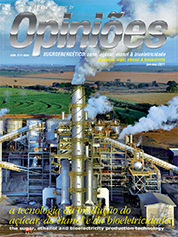Carlos Henrique de Brito Cruz
Scientific Director of FAPESP
Op-AA-27
Scientific and technological challenges for the competitiveness of biofuels
Brazil occupies an important position in world leadership in terms of knowledge about ethanol and its application, unlike what we are used to seeing in matters related to scientific and technological research. Most scientific publications about improvements and studies on sugarcane are created in Brazil.
In the technological field, knowledge about fermentation and production processes of ethanol from sugarcane saccharose is highly developed. Dual-fuel engines developed in Brazil, even by foreign companies, are the best and most competitive, encompassing many ingenious ideas created by Brazilian engineers.
Leadership is also evident in the institutional context and in terms of government policies: since 1931 there has been legislation in the country mandating the addition of ethanol to gasoline, and after 1975, the “Proálcool” program brought about the world’s greatest experiment in using ethanol as fuel.
The production cost of ethanol from sugarcane is the lowest in the world. Ethanol from sugarcane has the advantage that it is positive energy-wise: to produce one liter of ethanol from sugarcane consumes a tenth of a liter of oil equivalent; for the production of a liter of ethanol from corn, the consumption is almost one liter of oil equivalent.
Ever since Martim Afonso de Souza introduced the sugarcane plant in Brazil, in 1532, the economic importance of sugar resulted in a continuous effort to perfect its cultivation. Our current advantage has since been built up. All this creates a favorable situation for the country to take advantage of the opportunity to produce and sell ethanol to the world, but also to create and trade the production technology of ethanol from sugarcane.
This scenario is the basis for a very special situation. At the same time, it creates a challenge which we – industry, academy and the government – need to worry about: how to uphold this leadership in the world context, in which, especially after 2005, countries with a much more advanced scientific and technological tradition than ours, particularly the United States, began dedicating some of their scientific and technological efforts to biofuels?
The United States’ interest in ethanol is excellent for Brazil, because it helps to legitimize, around the world, what our country for a long time has known and shown since the mid 1980’s: that ethanol can seriously be viewed as partial replacement for gasoline. Essential to upholding Brazilian competitiveness in this matter is technological progress and knowledge about sugarcane, and about the production process of ethanol from sugarcane and its ramifications, such as bioelectricity.
This requires the intensification of research activities in public institutions and private companies on theme subjects such as: improvements to the sugarcane plant, improvements to its planting and harvesting, social and environmental impacts, production technologies for ethanol – there included, hydrolysis and fermentation —, and also as related to applications of ethanol as a replacement for oil in the petrochemical industry.
On this research agenda for Brazilian competitiveness in ethanol a lot stands to be achieved with more cooperation among universities, research institutes and companies. In view of the importance of the State of São Paulo as a producer of bioethanol and the richness of its research infrastructure, FAPESP - Fundação de Amparo à Pesquisa do Estado de São Paulo, in 2008 created a program called Programa FAPESP de Pesquisa em Bioenergia - Bioen (the FAPESP program for research in bioenergy), with the objective of contributing to place Brazil among the world leaders in the field of bioenergy.
In the next five years, about R$ 80 million will be invested by the FAPESP Foundation and its private and public partners in research in this sector. These resources will be added to many others coming from federal agencies (CNPq - Conselho Nacional de Desenvolvimento Científico e Tecnológico, Finep - Financiadora de Estudos e Projetos) and from State-run entities (Fapemig - Fundação de Amparo à Pesquisa do Estado de Minas Gerais), and companies such as Vale, Dedini, Oxiteno, Braskem and, in the near future, ETH. The FAPESP Foundation is continuing its search for companies interested in partnerships to co-finance research.
Small companies such as Fermetec have research projects supported by Pipe FAPESP and associates of the program. Prior to setting up Bioen, a substantive study was conducted, financed by the FAPESP Foundation, on the scientific and technological challenges for Brazilian ethanol, which was recently published abroad.
With the intent of proactively placing the Brazilian community in the global research chain and increasing Brazil’s exposure to science and technology focused on bioenergy, and with the support of FAPESP, an international conference has been scheduled - BBest - Brazilian Bioenergy Science and Technology Conference, to be held in Campos do Jordão, from August 14 to 18, 2011.
We wish to express our expectation that there will be massive attendance at the BBest, of researchers and engineers with ties to the industry’s companies, along with their colleagues from academy, debating the most advanced results obtained in science and technology of ethanol in the country.




